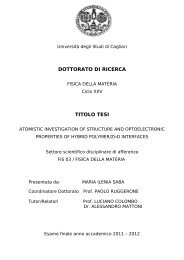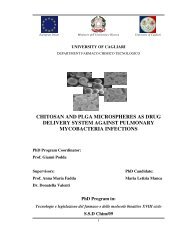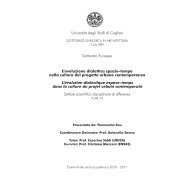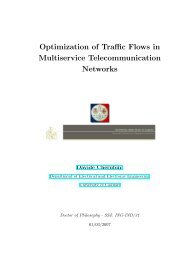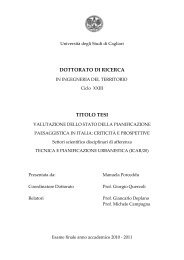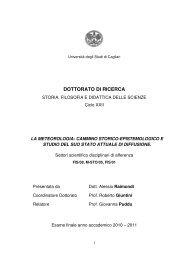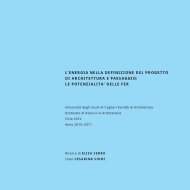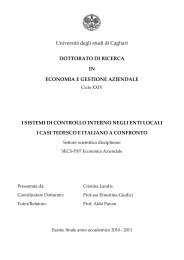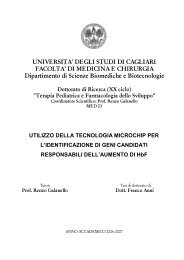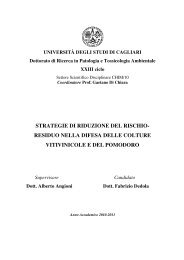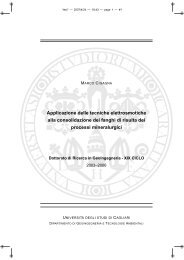The only truly alien planet is Earth. - UniCA Eprints - Università degli ...
The only truly alien planet is Earth. - UniCA Eprints - Università degli ...
The only truly alien planet is Earth. - UniCA Eprints - Università degli ...
Create successful ePaper yourself
Turn your PDF publications into a flip-book with our unique Google optimized e-Paper software.
negativo, buio, lunare, ne fa una figura vampiresca 446 . La frenesia sessuale che coglie Blake fin dal<br />
suo ritorno dal regno dei morti è comune a entrambi gli aspetti. Come un vampiro Blake trae<br />
energia dalla forza vitale altrui, inglobando nel proprio i corpi <strong>degli</strong> altri, in una forma di atroce<br />
cannibal<strong>is</strong>mo metaf<strong>is</strong>ico, tanto più d<strong>is</strong>turbante in quanto nemmeno i bambini sono esclusi dalla sua<br />
dieta particolare, tutt’altro:<br />
Within me I could feel the bodies of ten-year-old Sarah and her little brother, and of a teenage boy.<br />
Jealous of their freedom I had not released them when we landed. I needed their young bodies and spirits to<br />
give me strength. <strong>The</strong>y would play forever within me, running across the dark meadows of my heart. I had<br />
still not eaten, although th<strong>is</strong> was the fourth day since my arrival, but I had tasted the flesh of these children<br />
and knew that they were my food 447 .<br />
Si può tracciare un parallelo tra Blake e il suo nuovo potere di creazione attraverso il seme umano e<br />
gli atti rituali di sesso e violenza dei protagon<strong>is</strong>ti di Crash, dove il gioco di rimandi alla realtà da<br />
parte dell’autore vede assegnato al protagon<strong>is</strong>ta-narratore del romanzo il nome ‘Jim Ballard’:<br />
[…] Vaughan’s semen <strong>is</strong> described as having “bathed” the landscape, and as “irrigating” the lives of<br />
its inhabitants ([Crash] p. 146), while the narrator proposes that the “translation” or ritualization of the<br />
deaths and injuries of traffic casualties into acts of sexuality represents “the <strong>only</strong> way of re-invigorating<br />
those wounded and dying victims” ([Crash] p. 146). […]After Vaughan’s death, the narrator performs an act<br />
of “ritual love” ([Crash] p. 170) with h<strong>is</strong> wife in Vaughan’s car, anointing the deathcar with h<strong>is</strong> semen,<br />
celebrating the d<strong>is</strong>semination throughout the world of Vaughan’s potent, fructifying, redemptive energies<br />
[…] 448 .<br />
Blake si interroga razionalmente su ciò che gli accade, e ipotizza che possa essere<br />
un’allucinazione r<strong>is</strong>ultato di un’emorragia cerebrale:<br />
[…] [As] if I was struck by a sudden blackout or brain haemorrhage – and I d<strong>is</strong>covered the real<br />
meaning of the events taking place around me. I suspected that a blood-clot deep in my brain might be<br />
responsible for my strange v<strong>is</strong>ions and for the d<strong>is</strong>locations of time and space 449 .<br />
A questa considerazione segue la descrizione della percezione da parte sua di immagini<br />
d<strong>is</strong>torte, allucinatorie, come le linee bianche del campo da tenn<strong>is</strong> sospese al di sopra del terreno o<br />
gli occhi rossi dei cervi come obiettivi di raggi laser. Miriam St. Cloud prende atto delle peculiarità<br />
di Blake, definendolo un dio pagano; definizione in cui il nostro protagon<strong>is</strong>ta si riconosce,<br />
446 «By the end of the novel, Blake has also become both a redeeming and a vampiric figure. He then realizes that h<strong>is</strong><br />
newly acquired pansexuality, and the various forms of perversion which accompany it (which include dreams of murder<br />
and paedophiliac urges) were <strong>only</strong> a prelude to h<strong>is</strong> ‘wedding’ with the whole town, in which he sets out to absorb<br />
everyone in Shepperton and definitively escape from h<strong>is</strong> former, corporeal self by achieving a god-like immortality.»<br />
M. Delville, op. cit., p. 57.<br />
447 J. G. Ballard, Unlimited, op. cit., p. 163.<br />
448 G. Stephenson, op. cit., p. 73.<br />
449 J. G. Ballard, Unlimited, op. cit., p. 95.<br />
- 136 -



